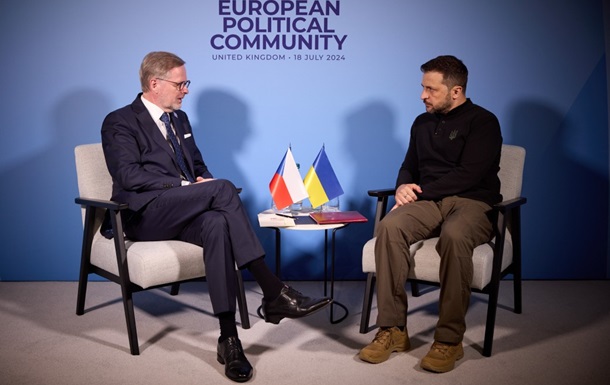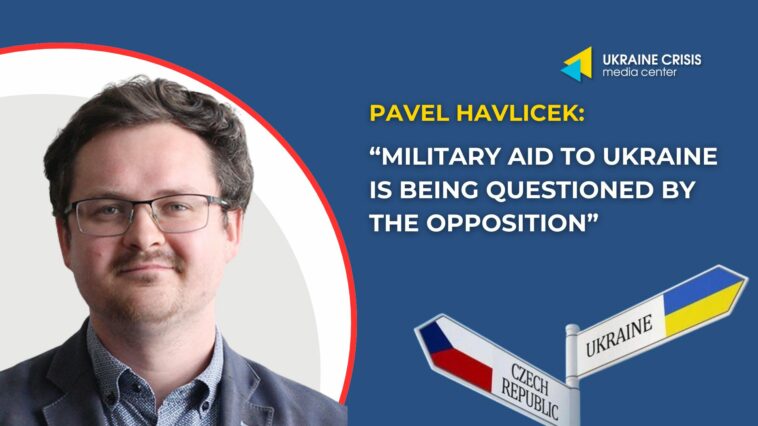This autumn, parliamentary elections will take place in the Czech Republic, shaping the country’s political landscape. The main intrigue lies in the potential return to power of Andrej Babis, who served as Prime Minister in 2017-2021. During the 2023 presidential elections, Babis portrayed his main opponent, retired army general Petr Pavel, as a “candidate of war.” Thus it is likely that Babiš’s ANO party may exploit the fear of war due to the high level of support for Ukraine provided by the current Czech government and president. Another prominent campaign issue could be the status of Ukrainian refugees.
We discussed the role of the Ukrainian issue in the Czech elections with Pavel Havlicek, research fellow at the Association for International Affairs of the Czech Republic.
Mr. Havlicek, does the Ukrainian issue appear in the rhetoric of Czech political parties and influential politicians?
The topic of Ukraine is part of the domestic political discourse, as the Czech Republic hosts the highest number of Ukrainian refugees per capita in the EU. Accordingly, the issue of status and benefits for asylum seekers from Ukraine may be instrumentalized by certain political parties during the election campaign.
One of the most common narratives relates to the budget expenses – namely, that the government should prioritize its “own citizens.”
Another significant narrative concerns the evaluation of the Russian threat to the Czech Republic. Within this narrative, voters face a range of questions, particularly concerning the limits of support for Ukraine and the justification for investments in the Czech Republic’s security sector. In light of news about the Russia-Ukraine war settlement, the issue of the Czech Republic’s participation in the so-called “coalition of the willing” has also become a hot topic.
Among the solutions to the Russia-Ukraine war being discussed is the deployment of European contingents to ensure security. If Czech troops are stationed in Ukraine after a peace agreement is signed, how might this affect public support for Ukraine in Czech society?
Most likely, negatively. The issue of the Czech Republic’s direct involvement in the conflict has a polarizing effect.
Even the provision of military equipment and ammunition to the Armed Forces of Ukraine is regularly questioned by the opposition. Therefore, the government has to “balance” public sentiment. As such, the initiative to send a Czech contingent to Ukraine could disrupt fragile balance, giving the opposition a strong reason to criticize the government.
Has the attitude towards Ukrainians living in the Czech Republic changed since 2022?
Before 2022, Czechs’ perception of Ukraine was shaped mainly by labor migration. Since then, Czechs have discovered many new facets of understanding Ukraine.
There is a stable majority that supports Ukrainian refugees, especially if they are willing to integrate, learn the language, and work in the Czech Republic.
At the same time, right-wing politicians, appealing to the anti-migrant sentiments of part of society, are broadcasting the thesis that after the end of hostilities, Ukrainians who found refuge from the war in the Czech Republic should leave the country.
However, not only the government but also Czech businesses oppose this view. I dare to say that the current growth rate of our economy directly depends on the presence of Ukrainians in the labor market.

How do you assess the potential impact of disinformation on the Czech elections? Is the government preparing to counter this threat, to prevent a scenario like we saw in the first round of Romania’s presidential elections in November 2024?
Thank you for raising this issue. It is indeed an important aspect of the upcoming elections and is widely discussed in the Czech Republic.
The precedent of the so-called “cancel culture” in Romania last autumn, after the first round of presidential elections – even due to justified reasons – has raised concerns among Czech politicians. However, unlike Romania, the Czech Constitutional Court does not have the authority to disqualify candidates.
I believe that preventing foreign informational interference is a priority to ensure the transparency and fairness of the electoral system. The Czech Republic has not yet adopted the Law on Digital Economy that aligns with the provisions of the European Digital Services Act (DSA). It grants national regulators additional powers to monitor social media and the online space, as well as the ability to prevent targeted disinformation campaigns. These initiatives are strongly supported by the ruling parties. Meanwhile, government opponents often interpret digital regulation as a restriction on freedom of speech, or even an attempt to introduce censorship.
What would you advise Ukraine regarding communication with Czech civil society and media to minimize the impact of anti-Ukrainian narratives?
Last July, a security agreement was signed between Ukraine and the Czech Republic, elevating the partnership to a strategic level and opening new opportunities, including in the context of joint disinformation countermeasures.

At the same time, it is necessary to maintain communication with all sides of the Czech political process. For example, it is worth remembering that Andrej Babis, often seen as an anti-Ukrainian politician, is primarily a pragmatist. In the past, Babis took a critical stance toward Russia. Let me remind you that in 2021, his government expelled dozens of Russian diplomats from the Czech Republic (due to Russian special services’ involvement in explosions at Czech ammunition depots in Vrbětice – UCMC). Thus, depending on the situation, Babiš may change his attitude towards the issue of support for Ukraine.
The Czech Republic should also study the experience of Ukrainians – sometimes painful and tragic, but invaluable in the face of regional security system degradation. This includes crisis management practices. Ukraine has accumulated a significant knowledge and practice that can be useful, for instance, in the area of state-civil society cooperation, or civil support for the armed forces.
In the media sector, it is important to support exchange programs. Currently, many Czech journalists are based in Ukraine, or travel there regularly. This ensures strong media presence, with on-the-ground reporting and conversations with locals. This contributes to a better understanding of the situation within Czech society.
Watch the interview:



